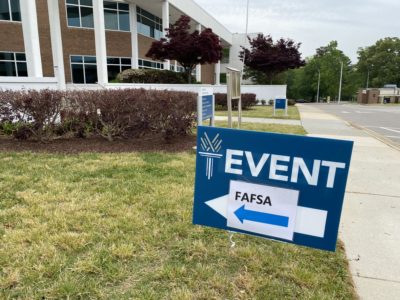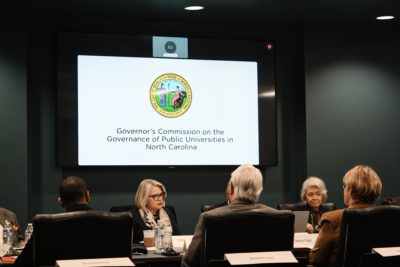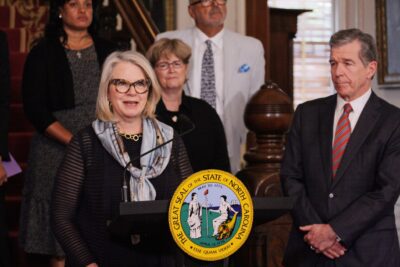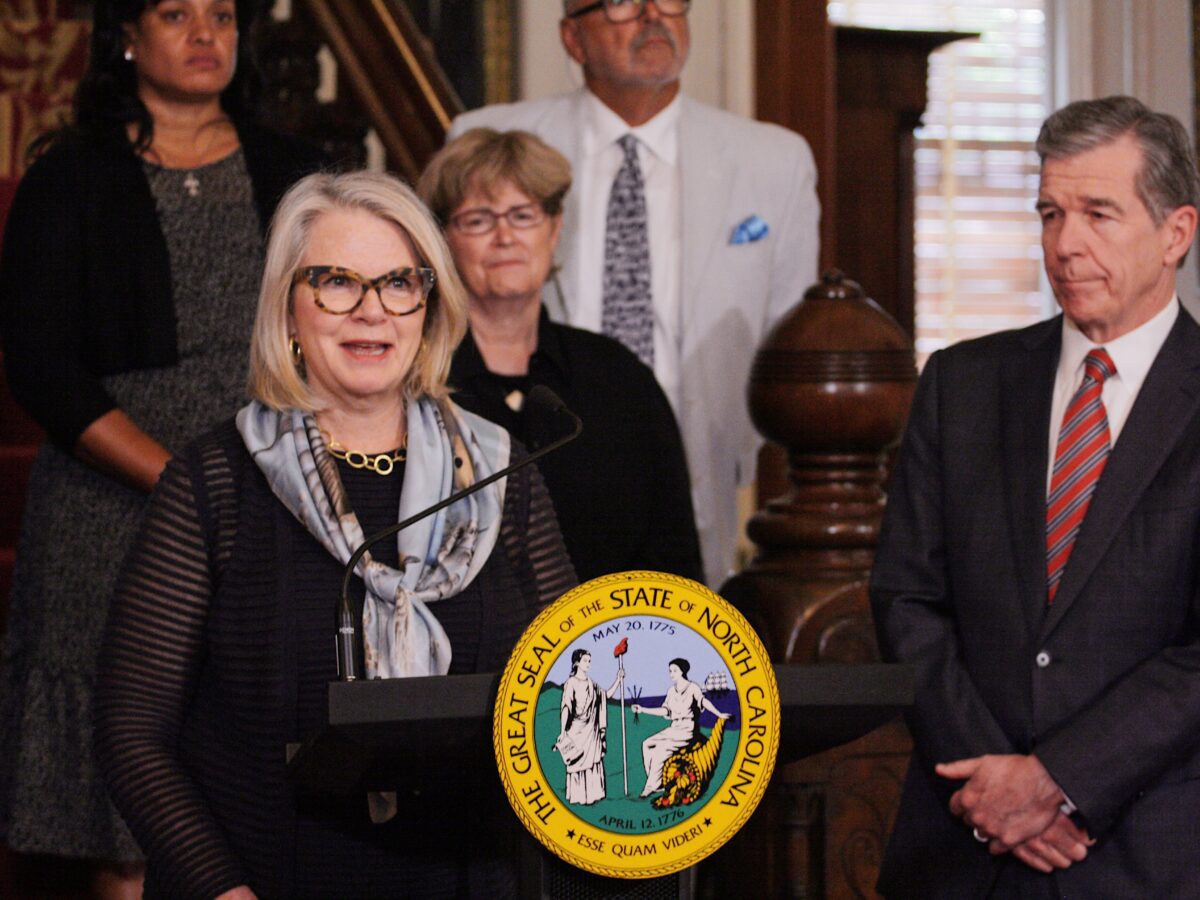

|
|
The Coalition for Carolina Foundation held a webinar on Thursday. If you haven’t heard of the coalition, here is their website, which says they are a “group of concerned alumni, faculty, staff, students, and allies of the University of North Carolina at Chapel Hill.”
Alumni and faculty Mimi Chapman, Joyce Fitzpatrick, Paul Fulton, and Roger Perry were introduced as founders of the coalition on the webinar.
The webinar featured former UNC System presidents Margaret Spellings (a Republican, who led the system from 2016-19) and Tom Ross (a Democrat, who led the system from 2011-16), and the stated purpose was to talk about Gov. Roy Cooper’s Commission on the Governance of Public Universities in North Carolina, which Spellings and Ross chaired, and how to push forward on the seven recommendations in the commission’s report.
There are a few other things to know before explaining why this matters for community college governance. The commission held listening sessions across North Carolina ahead of releasing its final report. Former UNC Chancellor Holden Thorp (2008-13) moderated the webinar, and in case you were wondering, Spellings is now leading the Bipartisan Policy Center in Washington, D.C.
The webinar ended up being an unusually candid, inside look at what it is like to lead the UNC System given the politics of North Carolina.
But the concerns raised are important for all of higher education, and particularly for our community colleges and the community college system, as the system responds to changes in governance by the legislature.
Recent legislative changes in community college governance
Community colleges are governed by both local boards of trustees and the State Board of Community Colleges. With 58 individual colleges, as opposed to 17 in the UNC System, the community college system has historically been more decentralized than the UNC System.
Until the most recent state budget was passed, local boards of trustees for community colleges were made up with four seats elected by the local board of education, four seats elected by the local board of commissioners, and four seats appointed by the governor. Additionally, “the president of the student government or the chairman of the executive board of the student body of each community college established pursuant to this Chapter shall be an ex officio nonvoting member of the board of trustees of each said institution. See N.C. General Statute 115D-12(a).”
This year’s state budget included a provision that changed who will be serving on local boards of trustees, giving the legislature more power. According to EdNC’s prior reporting:
The budget changed the selection process for these local boards. Eight trustees will be appointed by the General Assembly — two members annually. Four trustees will be elected by the board of commissioners of the county in which the main campus of the college is located. One of those four trustees can be a county commissioner.
In addition, each board of commissioners of any other county “in the administrative area that provides plant funds to the institution shall elect two additional trustees to the board,” the budget says, one of whom may also be a county commissioner. A board of commissioners can delegate the election of one or more of its trustees to a local school board of education if it so chooses.
The president of the college’s student government may also serve as an ex-officio nonvoting member, “if the board of trustees of the community college agrees.”
The new budget, passed in September, made several other governance changes to the community college system.
- The State Board of Community College’s election of a system president is now subject to confirmation by the General Assembly.
- The legislature now has the power to appoint 18 of the 19 members of the State Board, with the nineteenth member being the president of the North Carolina Comprehensive College Student Government Association (N4CSGA) as an ex officio member. Under the change, the governor no longer has any appointments to the Board.
- State law has historically given the State Board of Community Colleges the authority to approve or deny the election of local college presidents by local boards of trustees. The new budget adds reelection authority to the Board’s list of powers, which is being interpreted as requiring State Board approval for any contract renewals, extensions, or amendments for local presidents. The Board has proposed an amendment to the State Board of Community Colleges code to reflect that.
What Spellings, Ross, and Thorp had to say
Spellings said, “You know, these are tough, tough jobs on a good day.”
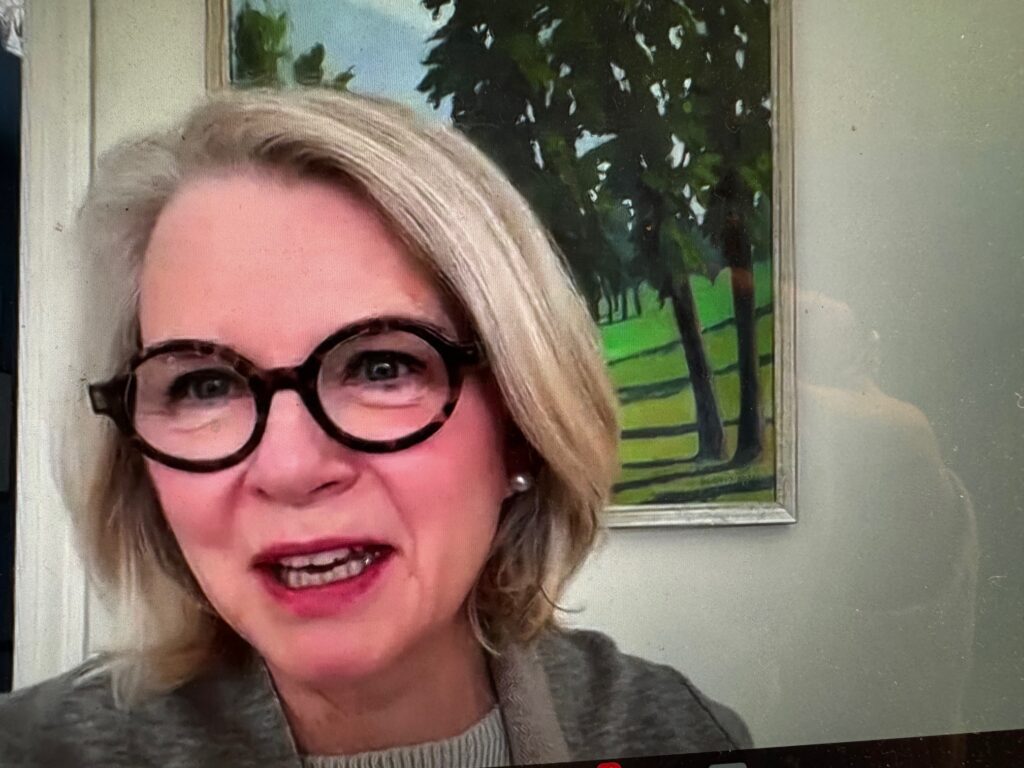

She went on to make the point that governance issues “chill the kind of talent pool that can be brought to bear for these jobs.” Paying attention to governance, she said, directly impacts the capacity of a college or university to “draw faculty and fantastic students” and “all of the things that add up to a fantastic enterprise.”
Thorp said, “North Carolina has… unduly complicated governance, because you have two sets of politically appointed governors: you have the Board of Governors and you have the Board of Trustees.”
When people would ask Thorp whether the Board of Governors or the UNC Board of Trustees were responsible for a given decision, he would say, “if things are going well, nobody knows the difference.” But lately, he said, there’s a lot of disagreement about roles and responsibilities, even when it’s unambiguous in the statutes.


“It’s very complicated and difficult to keep that many politically appointed people rowing in the same direction,” Thorp said, “and in my opinion that contributes to the extra chaos that happens in North Carolina.” He noted that candidates for these jobs have the option of working in states where governance is simpler and easier to navigate.
Spellings jumped in, “This much legislative engagement in the appointments process is unique to North Carolina. I think only Alaska has, you know, a bit of a similar model.”
She continued, “It is a challenging hand to play with this much legislative engagement and ownership with these high levels of funding.” She made note of the number of “cooks in the kitchen.”
Tom Ross agreed: “There is increasing confusion between what’s the Board of Governors responsibility and the Boards of Trustees… We recognize the overlap that’s there, and it really does need to be addressed.”
Some considerations for community college governance emerging from the discussion about the UNC System
While the report and recommendations issued by the commission were for the UNC System, they are instructive when thinking about the governance of our 58 community colleges, especially given the recent changes in policy.
Is the governance structure of the local boards and the system board “organized for success,” as Spellings asks?
What is the role and responsibility of the system, and what is the role of the local boards? How centralized or decentralized should it be? And how has that and is that shifting, and why?
Is there a way to monitor whether governance changes are chilling the talent pool at the local or statewide level?
The governor’s commission recommended the creation of a new Center of Higher Education Governance to optimize the use of good governance principles in the UNC System. How can the community college system get ahead of needing an external organization to play that role?
Local boards of trustees and the State Board of Community Colleges should consider the commission’s recommendation “to develop and deliver an orientation for all new board members (local and state), and maintain a database of trained and interested potential board members.”
Note the commission’s recommendations regarding diversity, length of term, and number of terms to reduce political influence. The goal, the speakers on the webinar said, was for people who were appointed to feel less obligation to the person or the organization that appointed them.
To enhance transparency and accountability of board members, the commission recommended all general business meetings of the Board of Governors and each Board of Trustees be livestreamed and recorded. That seems like a reasonable and good idea for community colleges too.
With regards to the role of the State Board of Community Colleges in both the initial election and now re-election of presidents of community colleges, I leave you with this comment from Margaret Spellings:
Optimally, obviously, you want a new leader to be embraced by, supported by, and given the chance to succeed by every corner of the university. And I think things that erode the ability for that individual to get off the starting line with that kind of support, it makes their job much more difficult…
To the extent that there’s an appearance of a crammed down, a rigged system, whatever, it makes it very, very challenging for the leader no matter what went on behind closed doors. So I think it makes it maybe less attractive for diverse candidates to raise their hands because they think the fix is already in, that there’s, you know, a person in mind and that’s that. It chills the talent pool, and, again, erodes the ability for that potential new leader to get off to a great start.




